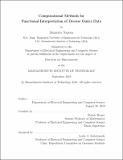| dc.contributor.advisor | Bonnie Berger. | en_US |
| dc.contributor.author | Nazeen, Sumaiya. | en_US |
| dc.contributor.other | Massachusetts Institute of Technology. Department of Electrical Engineering and Computer Science. | en_US |
| dc.date.accessioned | 2020-03-09T18:58:39Z | |
| dc.date.available | 2020-03-09T18:58:39Z | |
| dc.date.copyright | 2019 | en_US |
| dc.date.issued | 2019 | en_US |
| dc.identifier.uri | https://hdl.handle.net/1721.1/124115 | |
| dc.description | This electronic version was submitted by the student author. The certified thesis is available in the Institute Archives and Special Collections. | en_US |
| dc.description | Thesis: Ph. D., Massachusetts Institute of Technology, Department of Electrical Engineering and Computer Science, 2019 | en_US |
| dc.description | Cataloged from student-submitted PDF version of thesis. | en_US |
| dc.description | Includes bibliographical references (pages 199-218). | en_US |
| dc.description.abstract | Recent technological advances have resulted in an explosive growth of various types of "omics" data, including genomic, transcriptomic, proteomic, and metagenomic data. Functional interpretation of these data is key to elucidating the potential role of different molecular levels (e.g., genome, transcriptome, proteome, metagenome) in human health and disease. However, the massive size and heterogeneity of raw data pose substantial computational and statistical challenges in integrating and interpreting these data. To overcome these challenges, we need sophisticated approaches and scalable analytical frameworks. This thesis outlines two research efforts along these lines. First, we develop a novel three-tiered integrative omics framework for integrating and functionally analyzing heterogeneous omics datasets across a group of co-occurring diseases. We demonstrate the effectiveness of this framework in investigating the shared pathophysiology of autism spectrum disorder (ASD) and its multi-organ-system co-morbid diseases (e.g., inflammatory bowel disease, asthma, muscular dystrophy, cerebral palsy) and uncover a novel innate immunity connection between them. Second, we develop a new end-to-end computational tool, Carnelian, for robust, alignment-free functional profiling of whole metagenome sequencing reads, that is uniquely suited to finding hidden functional trends across diverse data sets in comparative analysis. Carnelian can find shared metabolic pathways, concordant functional dysbioses, and distinguish microbial metabolic function missed by state-of- the-art functional annotation tools. We demonstrate Carnelian's effectiveness on large-scale metagenomic studies of type-2 diabetes, Crohn's disease, Parkinson's disease, and industrialized versus non-industrialized cohorts. | en_US |
| dc.description.statementofresponsibility | by Sumaiya Nazeen. | en_US |
| dc.format.extent | 218 pages | en_US |
| dc.language.iso | eng | en_US |
| dc.publisher | Massachusetts Institute of Technology | en_US |
| dc.rights | MIT theses are protected by copyright. They may be viewed, downloaded, or printed from this source but further reproduction or distribution in any format is prohibited without written permission. | en_US |
| dc.rights.uri | http://dspace.mit.edu/handle/1721.1/7582 | en_US |
| dc.subject | Electrical Engineering and Computer Science. | en_US |
| dc.title | Computational methods for functional interpretation of diverse omics data | en_US |
| dc.type | Thesis | en_US |
| dc.description.degree | Ph. D. | en_US |
| dc.contributor.department | Massachusetts Institute of Technology. Department of Electrical Engineering and Computer Science | en_US |
| dc.identifier.oclc | 1142186996 | en_US |
| dc.description.collection | Ph.D. Massachusetts Institute of Technology, Department of Electrical Engineering and Computer Science | en_US |
| dspace.imported | 2020-03-09T18:58:38Z | en_US |
| mit.thesis.degree | Doctoral | en_US |
| mit.thesis.department | EECS | en_US |
